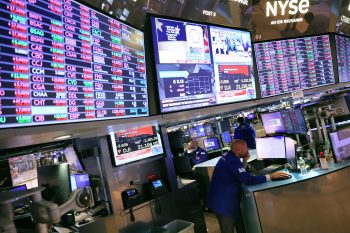Governments put limits on short selling
TEXT OF STORY
KAI RYSSDAL: The Secretary of the Treasury seems to have come to the same conclusion the markets have — that trying to tiptoe his way through the minefield that is Wall Street these days just is not going to work. There are reports this afternoon that Paulson’s thinking about going back to something that worked during the savings and loan crisis of the 1980s. Back then it was called the Resolution Trust Corporation. I don’t know what it would be called this time. But it would work almost the same way.
Chris Low is the chief economist at FTN Financial.
CHRIS LOW: What’s being discussed today is something similar, where a fund would be set up by the U.S. government that would go into the marketplace and buy up unwanted mortgage securities and hold them on the sidelines until some of the panic calmed down.
It didn’t take but a whisper that Paulson’s thinking about a systemic fix and the markets took off.
The other thing that bounced investors higher is a bit more technical. The Securities and Exchange Commission toughened its rules on short selling last night. That is, betting a stock price is going to go down. You borrow the stock, you sell it on that bet it’s going to go down, and then you can buy it back cheaper and return the borrowed shares. You pocket the difference.
Today the British government banned the shorting of financial firms outright. And New York Attorney General Andrew Cuomo launched an investigation into shorting of financial stocks there. We asked our senior business correspondent Bob Moon to explain why it matters.
BOB MOON: To make a short story, well, short . . . the free market just got a little less free with this crackdown on short selling. Even those who want to rein in the shorts concede it plays a key role in sniffing out companies in trouble.
Mark Coffelt is president and chief investment officer of Empiric Funds. He says short sellers might well have played a role in AIG’s fall from the 20s to around $2 a share in a week. But if the stock really was cheap at that price, he argues, buyers should have rushed in at some point:
MARK COFFELT: If I had confidence that AIG was not near bankruptcy, I would have bought it at $2 a share. So I think the short-sellers were right on.
Coffelt expects the SEC restrictions on short-sellers here in the U.S. to have little positive effect. If anything, he’s worried that a move to require big investors to reveal their short positions daily could backfire. If, for example, it forces a well-regarded hedge fund manager to show his hand, but only when he’s shorting a stock:
COFFELT: And you say, “Gosh, that’s a really smart guy.” Then I think you definitely run the risk of a pile-on.
Coffelt points out short-sellers don’t operate in a vacuum. Buyers also move stock prices.
COFFELT: It becomes very difficult to manipulate. There’s other people on the other side of the market.
But there’s no doubt short-selling has gotten hugely popular. Shortsqueeze.com tracked almost 30 billion shares that were “sold short” in the market late last month. That’s a sixfold increase over the last decade.
Robert Ellis is senior vice president of wealth management at Celent. He says once short-sellers get to work on a stock, the effect on would-be buyers can be as intimidating as jumping in front of a moving train.
ROBERT ELLIS: A lot of the professional traders I talk with are afraid of going up against the shorts. The rules have been tilted to their advantage. It’s so key a part of making money on Wall Street now, most firms make more money from securities lending – in other words, lending securities to short sellers – than they do on commissions.
He says the irony is, if you’re invested in a stock – perhaps through your 401(k) mutual fund — and hoping its value goes up — your fund manager might be lending that stock out to short-sellers. And they could be pushing the share value lower.
In Los Angeles, I’m Bob Moon for Marketplace.
There’s a lot happening in the world. Through it all, Marketplace is here for you.
You rely on Marketplace to break down the world’s events and tell you how it affects you in a fact-based, approachable way. We rely on your financial support to keep making that possible.
Your donation today powers the independent journalism that you rely on. For just $5/month, you can help sustain Marketplace so we can keep reporting on the things that matter to you.


















